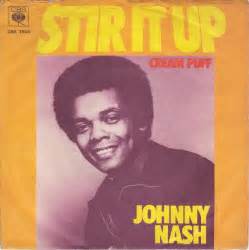| "Stir It Up" | |
|---|---|
| Single by Bob Marley and the Wailers | |
| B-side | "This Train" |
| Released | 1967 |
| Genre | Rocksteady |
| Length |
|
| Label | Trojan |
| Songwriter | Bob Marley |
| Producer | The Wailers |
| "Stir It Up" | ||||
|---|---|---|---|---|
 | ||||
| Single by Johnny Nash | ||||
| from the album I Can See Clearly Now | ||||
| B-side | "Cream Puff" | |||
| Released | March 1972 | |||
| Genre | Rocksteady (proto-reggae) | |||
| Length | 3:02 | |||
| Label | Epic | |||
| Songwriter | Bob Marley | |||
| Producer | Johnny Nash | |||
| Johnny Nash singles chronology | ||||
| ||||
"Stir It Up" is a song composed by Bob Marley in 1967 and first recorded by the group Bob Marley and the Wailers that year and issued as a single. It was later covered by American singer Johnny Nash on his 1972 album I Can See Clearly Now . The following year, Marley and the Wailers re-recorded the song for their album Catch a Fire .
Contents
- Certifications (Bob Marley & The Wailers version)
- Charts (Johnny Nash cover)
- Weekly charts
- Year-end charts
- The Black Sorrows version
- Track listing
- Charts
- Haddaway version
- Critical reception
- Track listing 2
- Charts 2
- References
The band performed "Stir It Up" on The Old Grey Whistle Test in 1973 during their first trip to the UK, singing live over a Chris Blackwell overdubbed backing track. [1]
"Stir It Up" was the first Marley-written song to be successful outside Jamaica. Another tune written by Bob Marley, "I Shot The Sheriff", was covered by Eric Clapton on the album 461 Ocean Boulevard , July 1974. Marley's first international hit recorded by him, "No Woman, No Cry", was released on the Bob Marley and the Wailers album Live! , December 1975.
